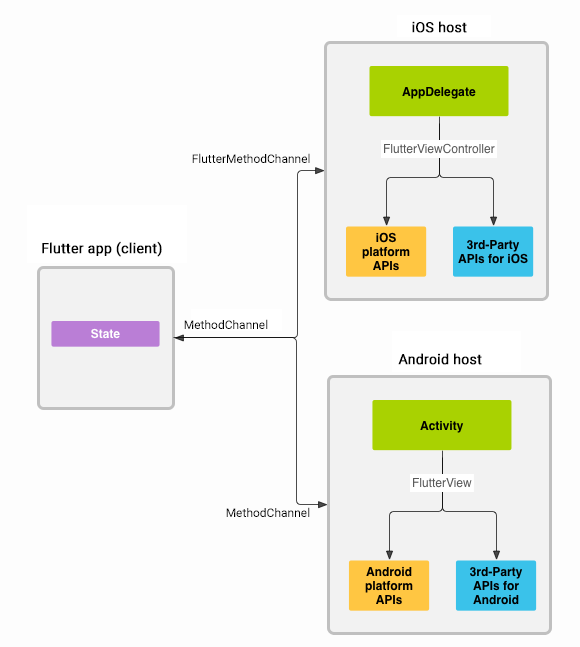google_mlkit_image_labeling 0.6.0  google_mlkit_image_labeling: ^0.6.0 copied to clipboard
google_mlkit_image_labeling: ^0.6.0 copied to clipboard
A Flutter plugin to use Google's ML Kit Image Labeling to detect and extract information about entities in an image across a broad group of categories.
Google's ML Kit Image Labeling for Flutter #
A Flutter plugin to use Google's ML Kit Image Labeling to detect and extract information about entities in an image across a broad group of categories.
PLEASE READ THIS before continuing or posting a new issue:
-
Google's ML Kit was build only for mobile platforms: iOS and Android apps.
-
This plugin is not sponsor or maintained by Google. The authors are developers excited about machine learning that wanted to expose Google's native APIs to Flutter.
-
Google's ML Kit APIs are ony developed natively for iOS and Android. This plugin uses Flutter Platform Channels as explained here.
Messages are passed between the client (the app/plugin) and host (platform) using platform channels as illustrated in this diagram:

Messages and responses are passed asynchronously, to ensure the user interface remains responsive. To read more about platform channels go here.
Because this plugin uses platform channels, no Machine Learning processing is done in Flutter/Dart, all the calls are passed to the native platform using
MethodChannelin Android andFlutterMethodChannelin iOS, and executed using the Google's native APIs. Think of this plugin as a bridge between your app and Google's native ML Kit APIs. This plugin only passes the call to the native API and the processing is done by Google's API. It is important that you understand this concept when it comes to debugging errors for your ML model and/or app. -
Since the plugin uses platform channels, you may encounter issues with the native API. Before submitting a new issue, identify the source of the issue. You can run both iOS and/or Android native example apps by Google and make sure that the issue is not reproducible with their native examples. If you can reproduce the issue in their apps then report the issue to Google. The authors do not have access to the source code of their native APIs, so you need to report the issue to them. If you find that their example apps are okay and still you have an issue using this plugin, then look at our closed and open issues. If you cannot find anything that can help you then report the issue and provide enough details. Be patient, someone from the community will eventually help you.
Getting Started #
Before you get started read about the requirements and known issues of this plugin here.
Firebase dependency for remote models #
Image Labeling can be used with both Base Models and Custom Models. Base models are bundled with the app, and custom Models can either be bundled with the app or downloaded from Firebase.
If you wish to use remote models hosted in Firebase, you must first enable the feature in iOS. Please see the additional setup instructions here.
To add Firebase to your project follow these steps:
Usage #
Image Labeling #
Create an instance of InputImage
Create an instance of InputImage as explained here.
final InputImage inputImage;
Create an instance of ImageLabeler
final ImageLabelerOptions options = ImageLabelerOptions(confidenceThreshold: 0.5);
final imageLabeler = ImageLabeler(options: options);
Process image
final List<ImageLabel> labels = await imageLabeler.processImage(inputImage);
for (ImageLabel label in labels) {
final String text = label.label;
final int index = label.index;
final double confidence = label.confidence;
}
Release resources with close()
imageLabeler.close();
Load local custom model #
To use a local custom model add the tflite model to your pubspec.yaml:
assets:
- assets/ml/
Add this method:
import 'dart:io';
import 'package:flutter/services.dart';
import 'package:path/path.dart';
import 'package:path_provider/path_provider.dart';
Future<String> _getModel(String assetPath) async {
if (io.Platform.isAndroid) {
return 'flutter_assets/$assetPath';
}
final path = '${(await getApplicationSupportDirectory()).path}/$assetPath';
await io.Directory(dirname(path)).create(recursive: true);
final file = io.File(path);
if (!await file.exists()) {
final byteData = await rootBundle.load(assetPath);
await file.writeAsBytes(byteData.buffer
.asUint8List(byteData.offsetInBytes, byteData.lengthInBytes));
}
return file.path;
}
Create an instance of [ImageLabeler]:
final modelPath = await _getModel('assets/ml/object_labeler.tflite');
final options = LocalLabelerOptions(modelPath: modelPath);
final imageLabeler = ImageLabeler(options: options);
Managing remote models #
Create an instance of model manager
final modelManager = FirebaseImageLabelerModelManager();
Check if model is downloaded
final bool response = await modelManager.isModelDownloaded(model);
Download model
final bool response = await modelManager.downloadModel(model);
Delete model
final bool response = await modelManager.deleteModel(model);
Example app #
Find the example app here.
Contributing #
Contributions are welcome. In case of any problems look at existing issues, if you cannot find anything related to your problem then open an issue. Create an issue before opening a pull request for non trivial fixes. In case of trivial fixes open a pull request directly.


